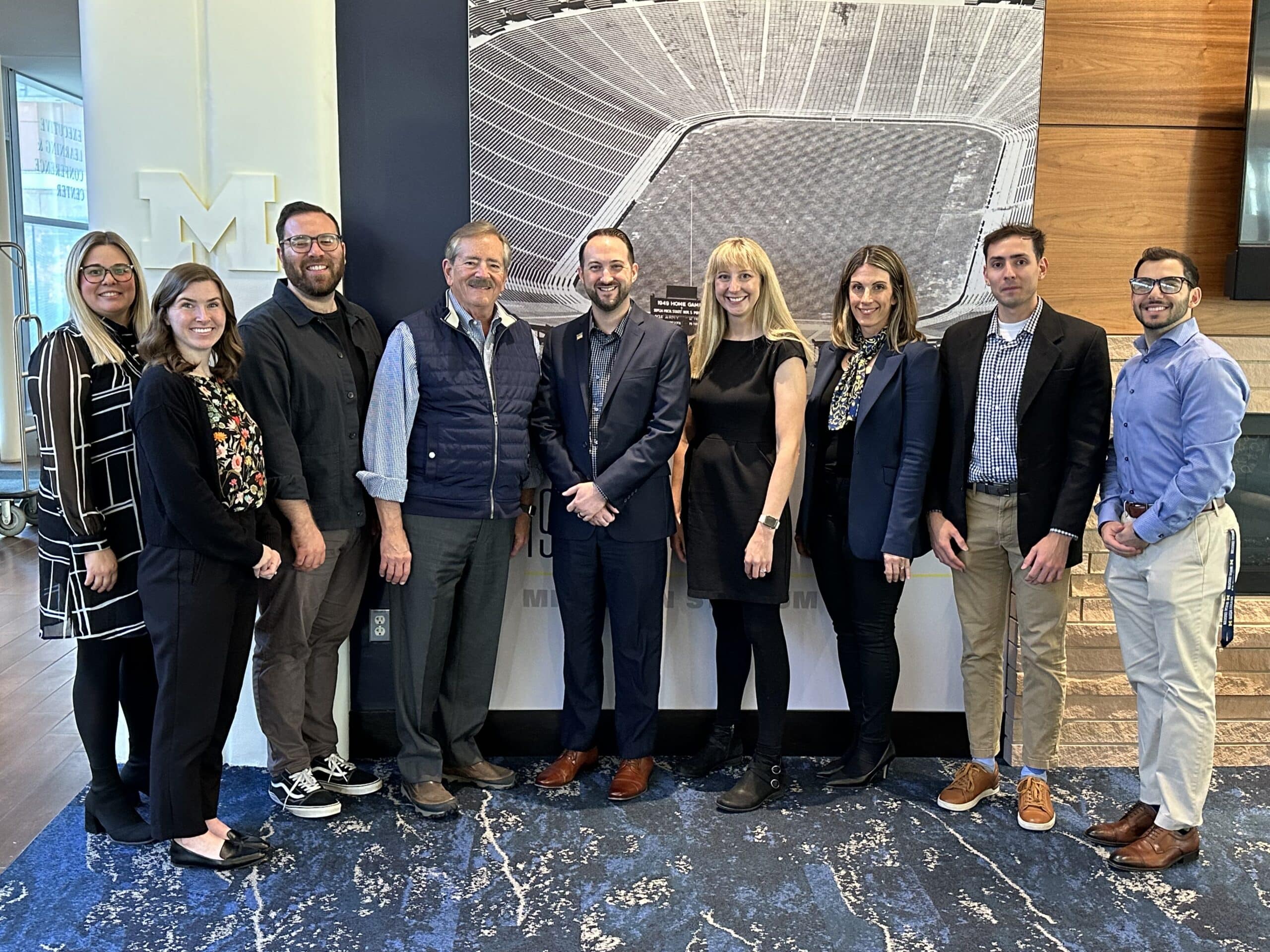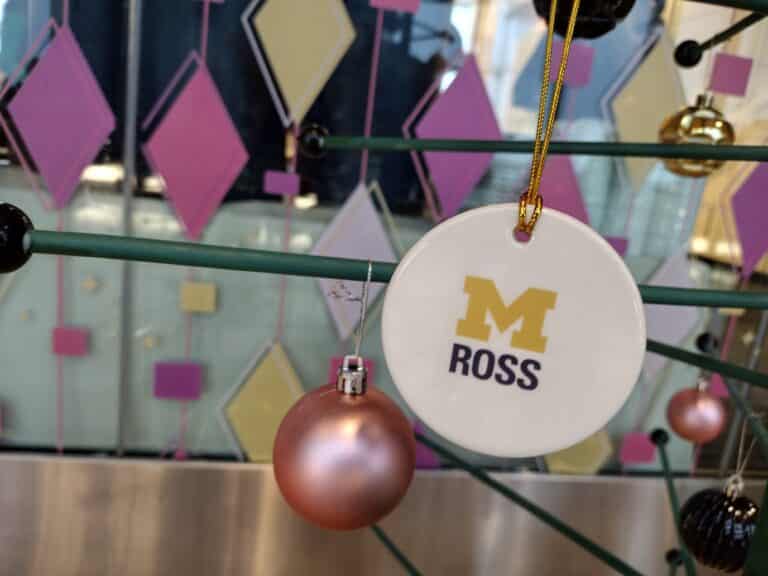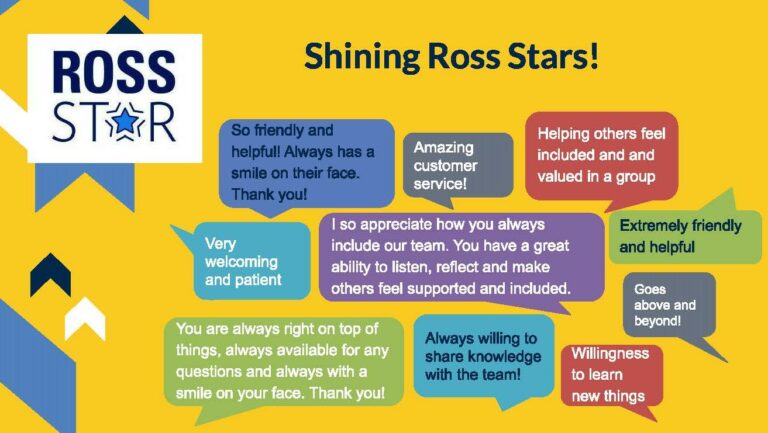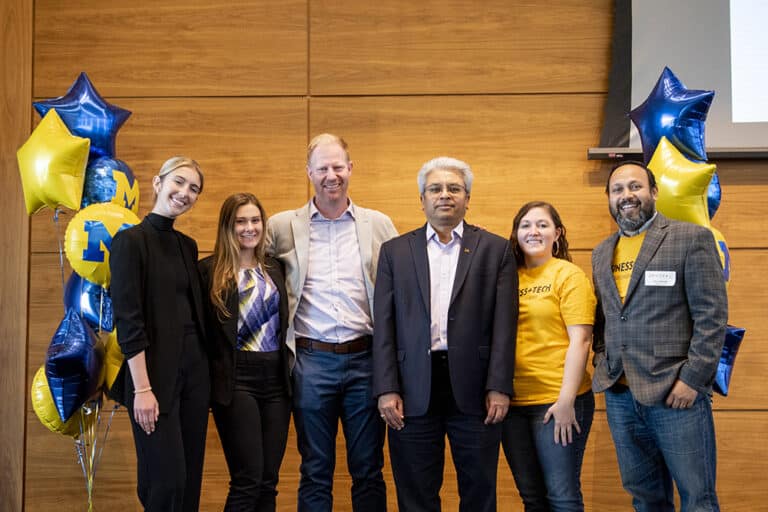Celebrating 10 Years: The Sanger Leadership Center Collaborates to Impact Business Education and Develop Future Leaders
Established in 2015 with a generous gift from Stephen Sanger, MBA ’70, and Karen Sanger, the Sanger Leadership Center has been a hub for leadership development at Michigan Ross for almost 10 years. Operating on the idea that leadership is a skill that everyone can learn, the center offers programs that prepare Michigan Ross and University of Michigan students to be strong, inclusive leaders who can make a difference in the world.
“A big part of building a better world through business is how we train people to think about what it means to build a better world,” said Jeff Domagala, managing director of the Sanger Leadership Center. “All of our programming is designed to help individuals accelerate their leadership development so that they can act with intention.”
Programming to shape tomorrow’s leaders
Led by Domagala, Director of Programming Michelle Austin, and Faculty Director Lindy Greer, the Sanger team consists of eight full-time staff members and one part-time temporary staff member. According to Domagala and Austin, a large part of their work is ensuring that every Ross student receives leadership training as part of their education.
To do this, the team coordinates with every Michigan Ross academic program office to offer Collaboration Lab, a required leadership program that complements coursework, internships, and action-based learning experiences. The Sanger team and select faculty first engage with students during orientation to emphasize the importance of leadership education and share how students can use the Michigan Model of Leadership and the Sanger Leadership Journey throughout their time at Ross. For those programs that include a Multidisciplinary Action Project or Consulting Studio component in their curriculum, Sanger also works alongside the Office of Action-Based Learning to ensure students are equipped with the leadership skills and support they need to be successful during MAP and Consulting Studio.
“We focus heavily on team-based leadership, especially in orientation,” said Austin. “We’re really excited this year to be working with all program offices when they onboard their students. We are customizing our material for each of the student audiences to get at why leadership is important.”
The Sanger Leadership Center also offers co-curricular opportunities to engage and teach leadership skills to all U-M students. Its most well-known annual event is the Leadership Crisis Challenge, in which students are immersed in a simulated business and media crisis and must strategize and respond to the crisis as it unfolds. The event culminates in a final presentation to a board of directors made up of University of Michigan alums at Michigan Stadium, and each year engages over 400 students and more than 90 alums, faculty, and staff.
Teaching the Michigan Model of Leadership
Sanger bases all of its programming on the Michigan Model of Leadership, a research-based framework that utilizes assessments that help individuals understand which leadership skills they have already developed and which skills need improvement. The MMoL asserts that the leadership skills one needs fall into four quadrants: collaborate, innovate, provide structure, and drive results. To be an effective leader, one must possess a level of skill in each of the quadrants.
For the past year, with the help of Emeritus Professors Robert Quinn and Kim Cameron, as well as other Ross faculty, the Sanger team has been working to consolidate what were previously multiple versions of the MMoL into a single, more visually simple model. The team also added a table of 24 skills that students can improve during their time at Ross.
In addition to students, the MMoL offers a suite of teaching resources for all faculty and staff at Ross and the broader university.
“Given the importance of professional development at Ross, we would encourage everyone to explore the Michigan Model of Leadership resources and talk to us about opportunities available to use the resources on your own as individuals and teams,” said Austin.
Celebrating 10 years and looking to the future of leadership education
The Sanger team is looking forward to celebrating its 10-year anniversary at Michigan Ross. The team is already planning a celebratory event for the entire Michigan Ross community, including faculty and staff, that will be held in tandem with their Leadership Dialogues Speaker Series.
“We are grateful for the support of our donors and the entire Michigan Ross community,” said Domagala. “We look forward to sharing more details and inviting everyone to celebrate this important milestone with us in the coming year.”
In the coming years, the Sanger team would like to expand the center’s reach and share the MMoL on a broader scale. They want to collaborate outside of U-M to further develop their programming and resources to meet the needs of future leaders.
For that reason, the entire Sanger team will travel to Philadelphia in December to represent Michigan Ross and U-M in the 2024 Leadership Educators Institute. This event is an opportunity for leadership educators from across the country to exchange ideas and advance leadership education. At that event, members of the Sanger team will lead two sessions to educate other leadership development professionals about community building, pedagogies, and scaling strategies. While on the East Coast, the team will also plan to visit the McNulty Leadership Program at the Wharton School, one of the largest global leadership centers, to gain insights and share best practices.
Also, in June 2025, Sanger will host the New Directions in Leadership Research Conference at Michigan Ross. This event will bring together faculty and researchers from other universities to present their work on the study of leadership and ethics, benefit from diverse perspectives, and exchange ideas related to innovative leadership programs.
“New generations of leaders require a new and different set of skills to thrive in today’s world,” Domagala explained. “Supporting their development will be absolutely essential. To achieve this, we must focus on continued fundraising, investing in our team, and creating an infrastructure that ensures operational excellence.”







